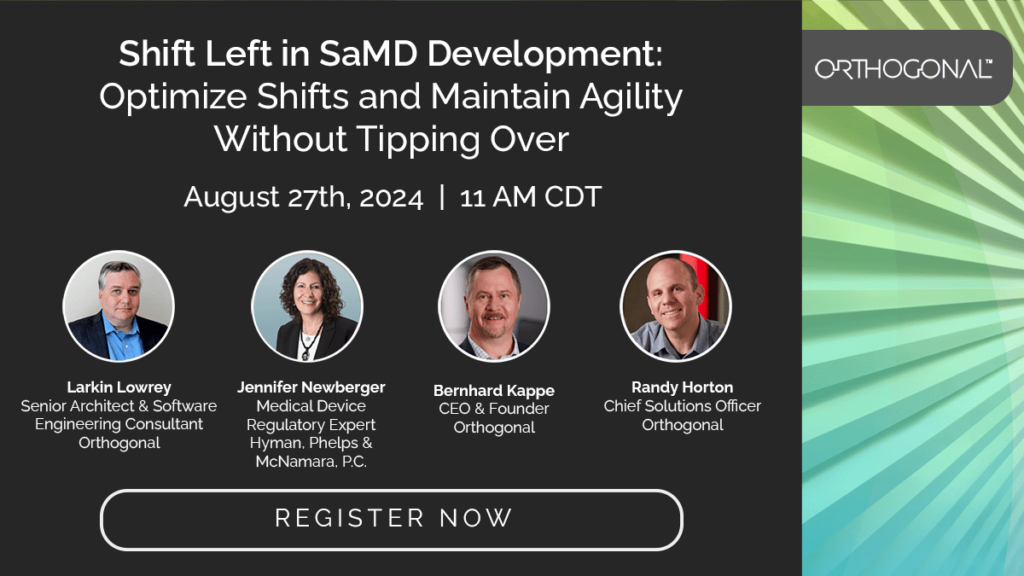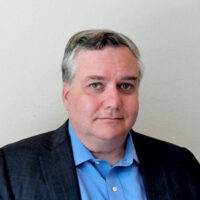
Talk
Evolving Your SaMD with Ongoing Releases: Webinar

At a recent well-respected MedTech conference, the concept of “Shift Left” was brought up in over half of the presentations. Coined in 2001 by software developer Larry Smith, Shift Left is the principle of moving activities such as design, testing and regulatory feedback from their traditional places later in the development life cycle to earlier stages, when misconceptions, misalignments and bugs can be more easily and cheaply fixed. It’s a powerful concept at the core of many innovations in product development, quality and software circles.
However, after hearing Shift Left discussed for the umpteenth time, we began to wonder – is there a limit to how much you can Shift Left on every aspect of medical device software design and development? At a certain point, if every activity is shifted all the way to the left, do we run the risk of a well-tuned Agile project essentially “tipping over” and reverting all the way back to clunky old Waterfall methods?
Join Orthogonal for a webinar on August 27th at 11 AM CST, where we’ll look at techniques for optimizing Shift Left across an entire MedTech organization while maintaining the fundamental flexibility of Agile. Our speakers will discuss how Shift Left can be applied across a variety of MedTech functions including R&D, software engineering, cybersecurity, quality and regulatory affairs, product management and corporate leadership.
You’ll leave the webinar with:

Larkin Lowrey, Senior Architect & Software Engineering Consultant, Orthogonal
Larkin Lowrey stands as a distinguished leader in Software Engineering and Technology, boasting extensive experience across diverse sectors including Medical Devices, Vehicle Tracking and Fleet Management, Telecom, Industrial Controls, IoT, and e-commerce. His innovative contributions to these fields are underscored by his portfolio of 26 US patents.
In his role as the Senior Director of Software Engineering for Digital Health at Tandem Diabetes Care, Larkin spearheaded an Agile transformation that spanned multiple departments, including Software Engineering, Quality, Product Management, DevOps, Systems Engineering, and Regulatory Affairs. In the capacity of Chief Architect, he conceptualized and guided the construction of a novel, cloud-native analytics platform that now serves four continents and over a dozen regulatory jurisdictions.
Larkin is an alumnus of the University of California, San Diego, where he graduated with a degree in Cognitive Science. His studies emphasized the Philosophy of Science, Machine Learning, and Human Factors.
Jennifer Newberger, Medical Device Regulatory Expert, Hyman, Phelps & McNamara, P.C.
Jennifer Newberger is a medical device regulatory expert with over 15 years of experience across medical device, software, and digital health regulatory matters. After ten years as a regulatory attorney in the life sciences and digital health space, Jennifer joined Apple to help drive its global regulatory strategy. She played an instrumental role in obtaining Apple’s first de novo authorizations for its ECG app and irregular rhythm notification. After four years at Apple, Jennifer worked at Abbott Laboratories, providing support to the diagnostics and diabetes care business units in the US, Canada, and Latin America. Later, she joined Cognito Therapeutics as Vice President, Head of Regulatory Affairs and Compliance, later Senior VP, for two years. Jennifer has also served as a policy advisor at the U.S. Food and Drug Administration and a public health analyst at the Centers for Disease Control and Prevention.
Bernhard Kappe, CEO and Founder, Orthogonal
Bernhard Kappe is the Founder and CEO of Orthogonal. For over a decade, Bernhard has provided thought leadership and innovation in the fields of Software as a Medical Device (SaMD), Digital Therapeutics (DTx) and connected medical device systems. As a leader in the MedTech industry, Bernhard has a passion for launching successful medical device software that makes a difference for providers and patients, as well as helping companies deliver more from their innovation pipelines. He’s the author of the eBook Agile in an FDA Regulated Environment and a co-author of the AAMI Consensus Report on cloud computing for medical devices. Bernhard was the founder of the Chicago Product Management Association (ChiPMA) and the Chicago Lean Startup Challenge. He earned a Bachelor’s and Masters in Mathematics from the University of Pennsylvania, and a Bachelor’s of Science and Economics from the Wharton School of Business.
Randy Horton, Chief Solutions Officer, Orthogonal
Randy Horton is Chief Solutions Officer at Orthogonal, a software consulting firm that improves patient outcomes faster by helping MedTech firms accelerate their development pipelines for Software as a Medical Device (SaMD), digital therapeutics (DTx) and connected medical device systems. Orthogonal makes that acceleration happen by fusing modern software engineering and product management tools and techniques (e.g., Agile, Lean Startup, User-Centered Design and Systems Thinking) with the regulated focus on device safety and effectiveness that is at the heart of MedTech.
Horton serves as Co-Chair for AAMI’s Cloud Computing Working Group, as well as AAMI CR:510(2021) and the in-process Technical Information Report #115, all of which address how to safely move medical device computing functions into the cloud. He is a frequent speaker at conferences and webinars, including events hosted by AdvaMed, AAMI, HLTH, RAPS and the Human Factors and Ergonomics Society (HFES).
Related Posts

Talk
Evolving Your SaMD with Ongoing Releases: Webinar

Talk
Gathering Medical Device Data & Evidence: Webinar

Talk
What Medical Device Software to Develop Under QMS: Webinar Summary

Talk
Sizing up SaMD Projects for Success: Webinar